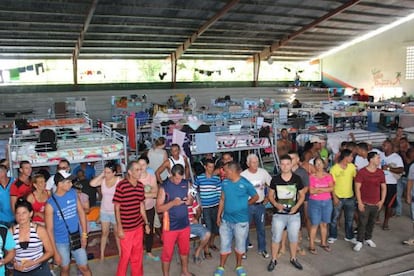Miami asks Obama for help dealing with arriving Cuban migrants
Florida authorities request financial aid to cope with incoming wave of newcomers


Florida authorities are asking President Barack Obama for federal assistance to meet the needs of about 9,000 Cuban immigrants who have been grounded in Central America and will begin their journey north to the United States starting next week. Most of the migrants are stranded in Costa Rica after Nicaragua denied them entry.
Florida mayors are asking the Obama administration for a specific plan to tackle this situation. Since Obama and Cuban President Raúl Castro announced plans to normalize diplomatic relations between their two countries on December 17, 2014, putting an end to more than half a century of hostilities, there has been a constant, almost daily, stream of Cubans arriving on American soil. Last year around 40,000 migrants from the island entered the United States – the biggest influx in the last decade.
Last year around 40,000 Cuban migrants from the island entered the US – the biggest influx in the last decade
Although the Obama administration has said on numerous occasions that it does not plan to revise the Cuban Adjustment Act – an immigration law that facilitates admission of Cuban newcomers and expedites citizenship applications for Cubans – there is a growing fear that the measure might be repealed. The president’s statement has not helped to discourage thousands of Cubans from traveling for months in order to reach American soil. Although some are still trying to get to the shores of Florida by boat, most have taken a longer, safer route through Central America and Mexico.
About 8,000 of them are now in Costa Rica, where they have been stuck since November 2015 after Nicaragua denied them entry. Another 1,000 are in Panama waiting to travel to the United States.
In late December, Central American nations agreed on a plan of action. Starting next week, Cuban refugees will be allowed to leave Costa Rica to travel by plane to El Salvador where they will be able to continue their journey through Guatemala and Mexico and finally to the United States. The first flight is expected to leave next Tuesday with 180 passengers aboard.
This Cuban migration has also led to a conflict between US federal and local authorities. “Ninety-nine percent of Cubans in Costa Rica want to come to Miami and they have no infrastructure waiting to assist them,” said Miami Mayor Tomás Regalado. “The federal government is the cause of this and they have to give solutions to a crisis that they have created.”
Regalado, a Cuban-born American and a Republican, has been warning that normalizing diplomatic relations with Cuba and fears that the Cuban Adjustment Act might be repealed could trigger a new Mariel boatlift. Between April and October 1980, 125,000 Cubans fled from Mariel Harbor to American shores. The crisis dramatically changed the demographics of the city and led to significant social changes after Fidel Castro took advantage of the situation to empty Cuba’s jails of common criminals – Miami crime rates shot up in the years that followed. The city has yet to heal completely from this crisis, the mayor added.
Regalado and other Florida mayors are asking the federal government to provide funds to help them tackle the situation. “We have exhausted the resources that we had from the federal government for the needy,” Regalado said.
The mayor has complained that the Obama administration has yet to respond to his request, saying: “I told them this could happen. Most of them are coming here in desperation, but no one has told us anything at all.”
Meanwhile, US State Department sources have said the issue is “delicate” and that the administration has no plans to change the Cuban Adjustment Act.
English version by Dyane Jean François.







































